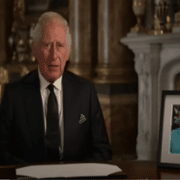Official: Leaders Should Show Emotion (Sparingly)
My 91-year-old mother was not impressed with King Charles III’s first address to the nation last Friday.
‘What was wrong with it?’ I asked
‘Not very kingly.’
‘You mean too emotional?
‘Yes. Sentimental and emotional. That is not his job!’
But times have changed and now showing you are human, moved and that you care is not just acceptable, it is de rigueur.
The Royal Family we know, learnt this the hard way. Hiding themselves away (with the exception of the then Prince Charles) when Princess Diana died in a car crash in Paris. Their struggle with an absolute requirement to show some emotion – as portrayed in the film The Queen in 2006 – was a turning point. Eventually, they did come out and we could see they were as shocked as the rest of us. The Queen made a television address that, whilst not exactly emotional, showed she was deeply affected. What was widely seen as a crisis for the Monarchy, quickly passed.
Prince Philip appeared never to have accepted the need to show emotion in public. He would likely have agreed with my mother that his son’s television address was much too sentimental. I can’t help speculating that Princess Anne probably thought the same.
King Charles’ broadcast on Friday evening, was calm and controlled but towards the end he was visibly moved. It is what modern Britain expects.
If you are a leader, and something shocking, sad, or threatening happens, you will be called upon to capture the moment and set the way forward. Nowadays, you are best advised to show that you, like others, are affected. But crucially the emotion must appear controlled.
Of course, your short timely speech will have other considerations: You must also remind everyone of what will outlast the death or the crisis, and what the path ahead is. You will want to give the impression that everything is under control.
Getting this balance right is not easy, and although our new King has had 60-plus years to plan for that moment, most leaders find themselves having to pull together a speech in under an hour.
The one I remember from my own career was in a regional BBC newsroom 35 years ago: we came into work expecting to hear good news about the birth of a baby to one of our colleagues. I remember knowing almost instantly that something was wrong, there was a terrible atmosphere. But no one knew what had happened. At 9 am, a relatively new editor (who also had young children) called a building-wide meeting, and we gathered very solemnly. He told us that mother and baby were doing fine but the child had Down’s Syndrome. He said that flowers had been sent in the usual manner. He acknowledged it was a shock but reminded us that the couple were resourceful and given time would adjust and cope fine. He asked us to refrain from talking about it in these first few hours and then made it clear he expected us to get on with the job of getting that day’s bulletins out in the normal way. I remember at the time thinking it was a remarkable mini-speech, portraying firmness and compassion, done without notes, at less than an hour’s notice.
It hit all the marks of showing he himself was affected and cared, but also reminding us it was not a tragedy, giving us guidance on how to behave and telling us to get on with the job.
Here are thoughts from other writers, on the issue of leaders and showing emotion.
Entrepreneur – Why it is Important Critical for Leaders to Show Emotion at Work
Forbes – Great Leaders Never Show Emotion, Until They Need to
- Media Savvy Operators Know How to Place a Quote - May 21, 2024
- The Magic of Performance - May 14, 2024
- Our Top Tips: - May 8, 2024




Leave a Reply
Want to join the discussion?Feel free to contribute!